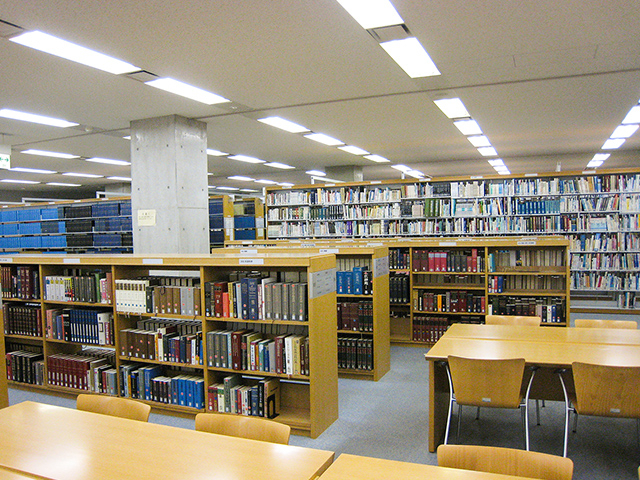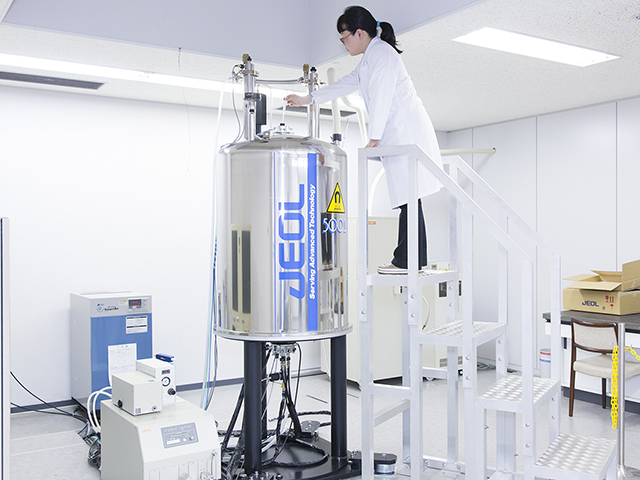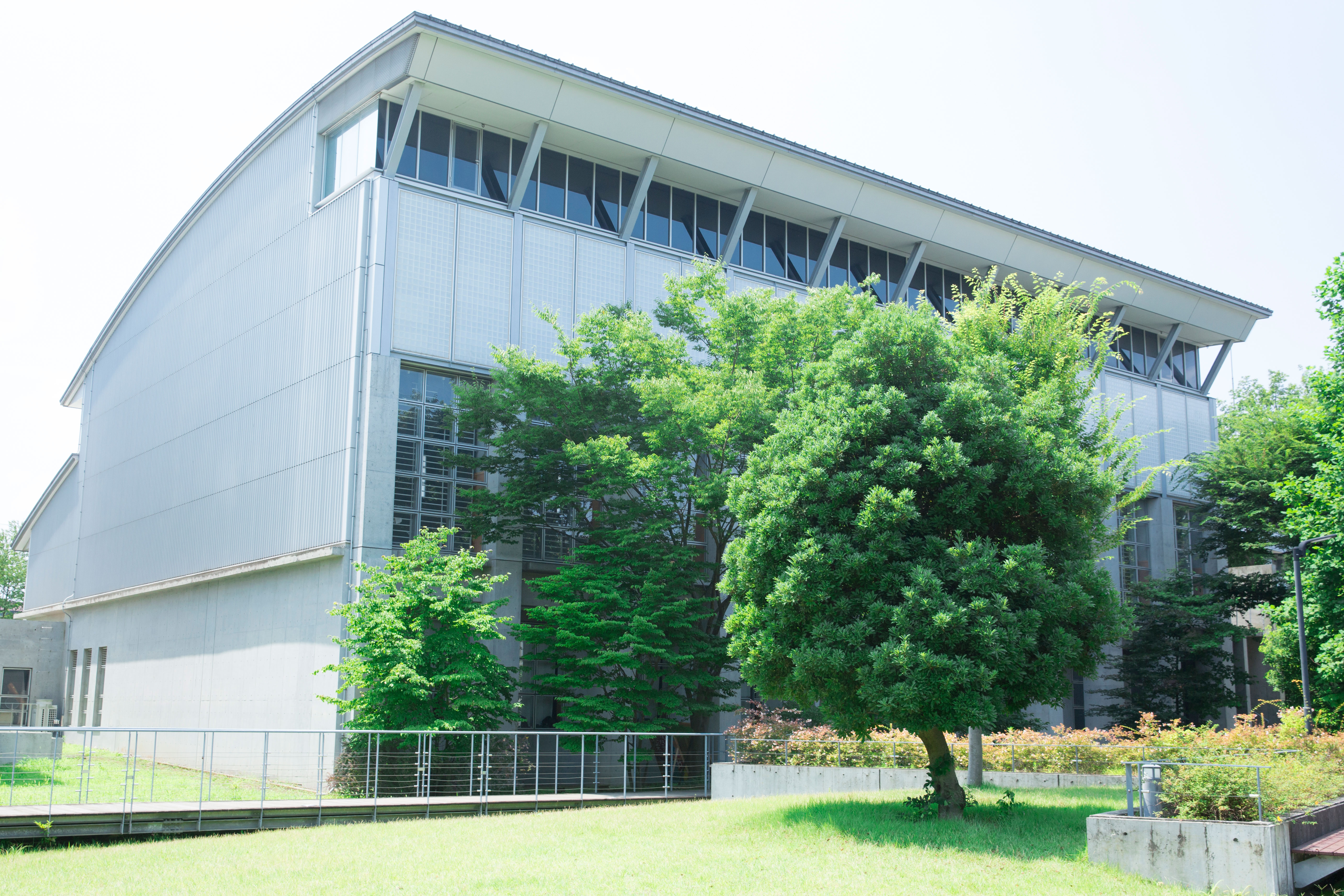Library

The library is equipped with 264 seats and provides open-shelf services where all users can browse freely. Current holdings include 140,000 books, 114 domestic and 139 overseas scientific journals. An audiovisual room and a group study room are equiped within the library, so that students can use them for those purposes. The library provides 3 PCs exclusively for searching data, 6 PCs in the audiovisual room, and 20 PCs in a self-study room located on the second floor. Wireless local area network(Wireless LAN)is also provided, and enables access for students' personal laptops in the library.
Center for Instrumental Analysis

The center for Instrumental analysis was founded in April 1971, for the purpose of "contributions to the process of educational research of Meiji Pharmaceutical University with doing the administration, management of the joint-use Instruments for educational research".
Facilities: It is located in the first floor of the research ridges and the fourth floor. Floorage is about 790 m2. Instruments: FT NMR spectrometer (270, 300, 400, 500 MHz), GC mass spectrometer, elemental analyzer, protein sequencer, amino acid analyzer.
Meiyaku Museum
The Meiyaku Museum was founded on the former campus in 1982, for the commemoration of the 80 year history of the university. The museum has three missions. The first is recognizing the great achievements of Shigenobu Onda (Pen name Godo), the founder of the university. The second is preserving and storing historical materials and documents of the university. The third is contributing to the pharmaceutical education by extensively collecting materials related to pharmaceutical sciences and displaying them.
When the museum was reconstructed at the time of relocating the campus to Kiyose, we enhanced its display, with lots of specimen of medicinal herbs which had been collected in the Department of Pharmacognosy and laboratory of Biology.
The museum contains objects related to the founder, Dr.Onda, and "The Ohara Pharmaceutical Collection". The collection includes old pharmaceutical equipment and articles donated by a pharmacist, Mr. Ohara. The tools were used in a pharmacy dating back about 200 years. Parts of the collection is on public display now. The museum provides a room for a permanent exhibition and meetings. There are videos available in the meeting room, as well as displaying of a variety of herbs.
Taking the opportunity of moving to the area of Musashino, a suburb of Tokyo, the museum has also introduced 10 local species of medicinal herbs and trees as mentioned on the sign board with the title of "Medicinal plants in Musashino". The board gives a brief explanation for such plants as Corydalis lineariloba,Zanthoxylum piperitum and Epimediuim marcranthum var. violaceum.
The museum housed herbal medicine which include Glycyrrhiza uralensis, Rheum palmatum and other different species as well. A well-structured-display helps visitors understand how herbal medicine is utilized for Kampo.
The museum also displays crude drug from animal products such as musk, a unicorn's tusk, a rhinocero's horn, a buck's horn, which are unable to be obtained under the condition of the Washington Pact today. A musk deer, the source of musk, was donated by one of our graduates recently. Components and usage are written on the sign board. Among traditional medicine produced by animals displayed in the museum, there are other valuable things such as Pangolin manis, Hippocampus coronatus and Gecko gecko. The mummy was loaned to the National Museum of Nature and Science for the special exhibition named "Cultural Records about Specters",held in November, 2006, and "Medicine as a Philanthropic Art" held in March-June, 2014.
The museum displays facsimile editions of classical books on pharmacy and medicine from overseas as well. The books include the complete works of Hippoctates, "codex Vindobonensis", and a Japanese old medical book "Kaitaishinsho, Tafel Anatomie" (the first legitimate work on Western medicine translated into Japanese), and "The Beginning of Dutch Learning".


RI Laboratory

The RI Laboratory offers the instruments and facilities for research and experiments, using isotopes.
Facilities: Located between the Research Building and the Practical Building, the laboratory has a floor space of about 780 m2. The first floor contains the control room, contamination inspection room, laboratory, measuring room, darkroom, RI storage room, biohazard room, animal metabolic experiment laboratory, animal holding room, scrap working room and waste storage room. In the basement are two storage tanks (10 m3 each), and a dilution tank (20 m3).
Model Dispensary

The Model Dispensary, is located on the third floor of the General Education and Research Building;Phronesis, and provides all the standard facilities of a real-life hospital dispensary. It is used to deliver OSCE for undergraduate students at their fourth year, and train fifth year students before they enter the clinical environment. Students enhance their performance through simulated experience-based learning, and improve the quality and ethics of a pharmacist as well.
Medicinal Plant Garden

A variety of plants, including original plants of herbal medicine listed in the Japanese Pharmacopoeia, have been planted and displayed in the Medicinal Plant Garden. The primary educational purpose of the Garden is to have students learn the history of pharmaceutical sciences through lectures and hands-on practice. In addition it gives our students the opportunities to observe or cultivate medicinal plants which are regarded as a significant resource material for medicines, and the origin of herbal plants. Medicinal plants and herbal medicine are also deeply ingrained within our daily life, especially because the recent popularity of healthy living has boosted the interests of Kampo(Japanese herbal medicine) or medicinal plants, from a viewpoint of self-medication and preventive medicine. We open the garden to the public so that we can promote the spread of knowledge about traditional medicine. Many varieties of mountain grasses are planted in a shady section which offers attractive aspects to people visiting in different seasons. Japan Pharmacists Education Center has promoted "Training courses for certification in the use of Chinese herbal medicine and natural drugs", that is one of the center's continuing education program. Meiji Pharmaceutical Medicinal Plant Garden is among those cooperating gardens to accept trainees for practical observation of the corse.
Sporting Facilities

Sport facilities are as follows:
1)Gymnasium: main floor (2F; basketball / volleyball / badminton, 853 m2), subsidiary-floor (table-tennis / kendo, 332 m2), Judo hall (judo / karate, 224 m2), Training room (88 m2), Locker rooms, Shower rooms,Toilets (131 m2)
2)Multipurpose ground (soccer / baseball: 9,649 m2)
3)Tennis courts (5 courts, 3600 m2): artificial greensward, under illumination.

